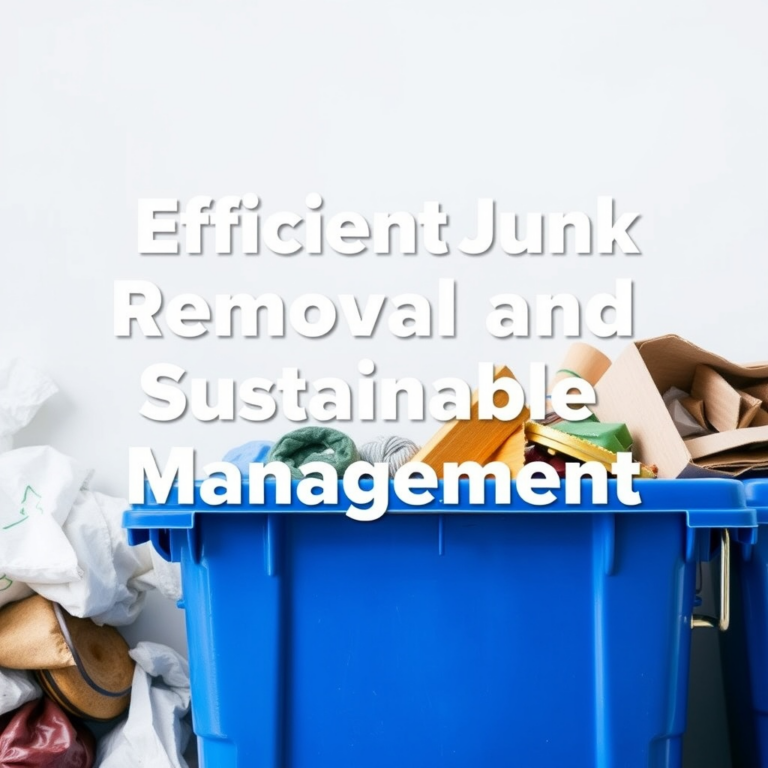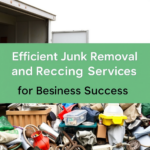Efficient Junk Removal and Recycling for Sustainable Waste Management
Discover effective strategies for junk removal and recycling that promote sustainable waste management and environmental impact reduction.
Understanding the Importance of Sustainable Waste Management
In recent years, there has been a significant push toward sustainable waste management practices. Environmental concerns are becoming more pressing, and recognizing our planet’s finite resources has underscored the necessity for efficient junk removal and recycling. These practices are crucial not only for alleviating the strain on overflowing landfills but also for fostering a circular economy. In this economy, waste is minimized, and resources are used responsibly, promoting sustainability and environmental health.
The Role of Efficient Junk Removal
Efficient junk removal is a cornerstone of sustainable waste management. This process encompasses the systematic collection, transportation, and disposal of waste materials. Unlike traditional methods, which often involve indiscriminate waste disposal, efficient junk removal focuses on sorting and segregation. It involves organizing materials into categories such as recyclables, compostables, and non-recyclables, ensuring appropriate handling for each type.
For example, items like paper, glass, and metals can be directly sent to recycling facilities, significantly reducing landfill volume. Hazardous materials, posing health and environmental risks, require meticulous handling and disposal. Companies specializing in junk removal are equipped to identify and manage such materials, ensuring compliance with local regulations.
Benefits of Proper Segregation
- Reduces landfill waste
- Promotes recycling
- Ensures safety and compliance
- Enhances resource recovery
Recycling as a Pillar of Sustainability
Recycling is a vital component of conserving natural resources and reducing greenhouse gas emissions. Converting waste materials into new products decreases the demand for raw material extraction, which is often energy-intensive. For instance, recycling aluminum cans saves 95% of the energy needed to produce aluminum from bauxite ore. Similarly, recycling one ton of paper saves approximately 17 trees, along with significant amounts of water and energy.
Enhancing recycling efficiency demands consumer education about proper waste segregation. Community programs and initiatives can encourage households to sort their waste accurately, preventing recyclables from contaminating landfill waste.
Community Involvement in Recycling
- Educational programs on recycling
- Household waste sorting initiatives
- Promotion of recycling habits
- Community recycling drives
Innovative Technologies in Waste Management
Technology is transforming the waste management industry. Smart bins equipped with sensors can notify waste collectors when nearing full capacity, optimizing collection routes and diminishing fuel consumption. In addition, advanced sorting systems using AI and robotics improve the efficiency and precision of recycling processes.
Another innovative development is biodegradable plastics, designed to decompose more rapidly and naturally than conventional plastics. These materials present a viable solution to long-term environmental impact, bolstered by advancements in material science.
Key Technological Advancements
- Smart bins for efficient collection
- AI and robotics in waste sorting
- Biodegradable plastics
- Waste-to-energy technologies
Practical Applications and Community Initiatives
Junk removal and recycling efforts find practical applications across various sectors, from corporate settings to residential communities. Businesses are increasingly adopting office recycling programs, integrating bins for paper, plastics, and compostables. Community-driven efforts such as neighborhood cleanups and recycling drives cultivate a culture of sustainability and environmental stewardship.
Cities play a pivotal role by establishing facilities like electronic waste drop-off centers and composting sites. These efforts not only manage waste effectively but also educate the public on sustainable practices. Encouragingly, some forward-thinking municipalities are adopting zero-waste policies, aiming to send no waste to landfills or incinerators.
Examples of Successful Initiatives
- Corporate office recycling programs
- Community-led cleanups and recycling drives
- Municipal electronic waste centers
- Zero-waste municipal policies
Overcoming Challenges in Junk Removal and Recycling
Despite numerous benefits, challenges persist in the realm of junk removal and recycling. Contamination remains a significant issue, as improper sorting can render entire batches of recyclable materials unusable. Effective public education campaigns and clear labeling systems can address this problem, fostering improved waste sorting behaviors.
Additionally, the fluctuating market value of recyclable materials can impact the profitability of recycling operations. To ensure sustainability, some recycling companies diversify operations by incorporating other waste management services such as composting or waste-to-energy technologies.
Strategies to Overcome Challenges
- Intensive public education on waste sorting
- Implementation of clear labeling systems
- Diversification into composting and waste-to-energy
- Strengthening market demand for recyclables
Towards a Sustainable Future
The journey toward sustainable waste management is undoubtedly a collaborative effort. Governments, businesses, and individuals all contribute to implementing efficient junk removal and recycling practices. With the right strategies and technologies, reducing waste and promoting recycling can be transformative, significantly contributing to environmental conservation and resource efficiency.
By investing in education, infrastructure, and innovations, society can further nurture a culture of sustainability. As we advance, sustainable waste management will become increasingly central to maintaining the delicate balance of our planet’s ecosystems for generations to come.





